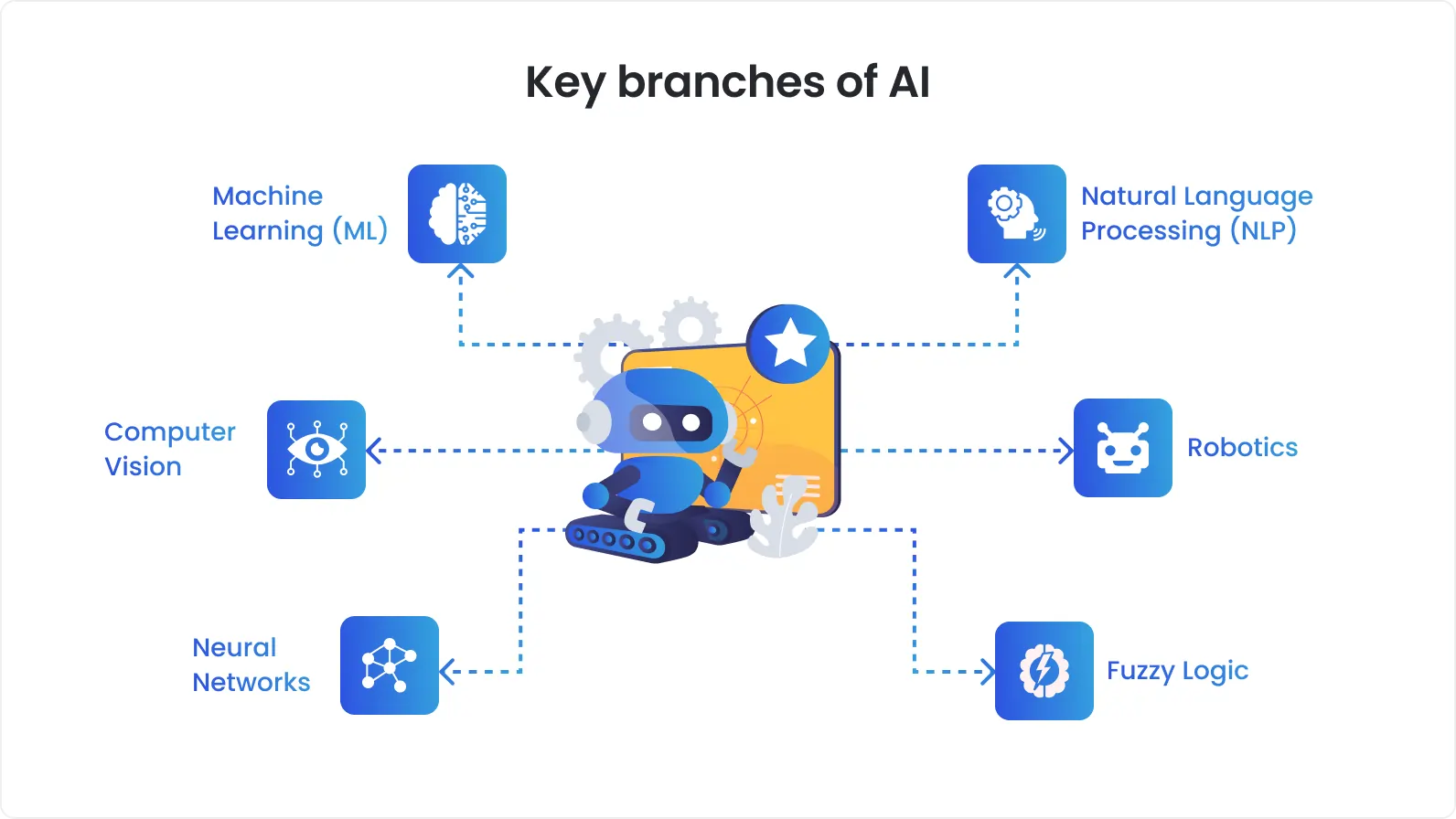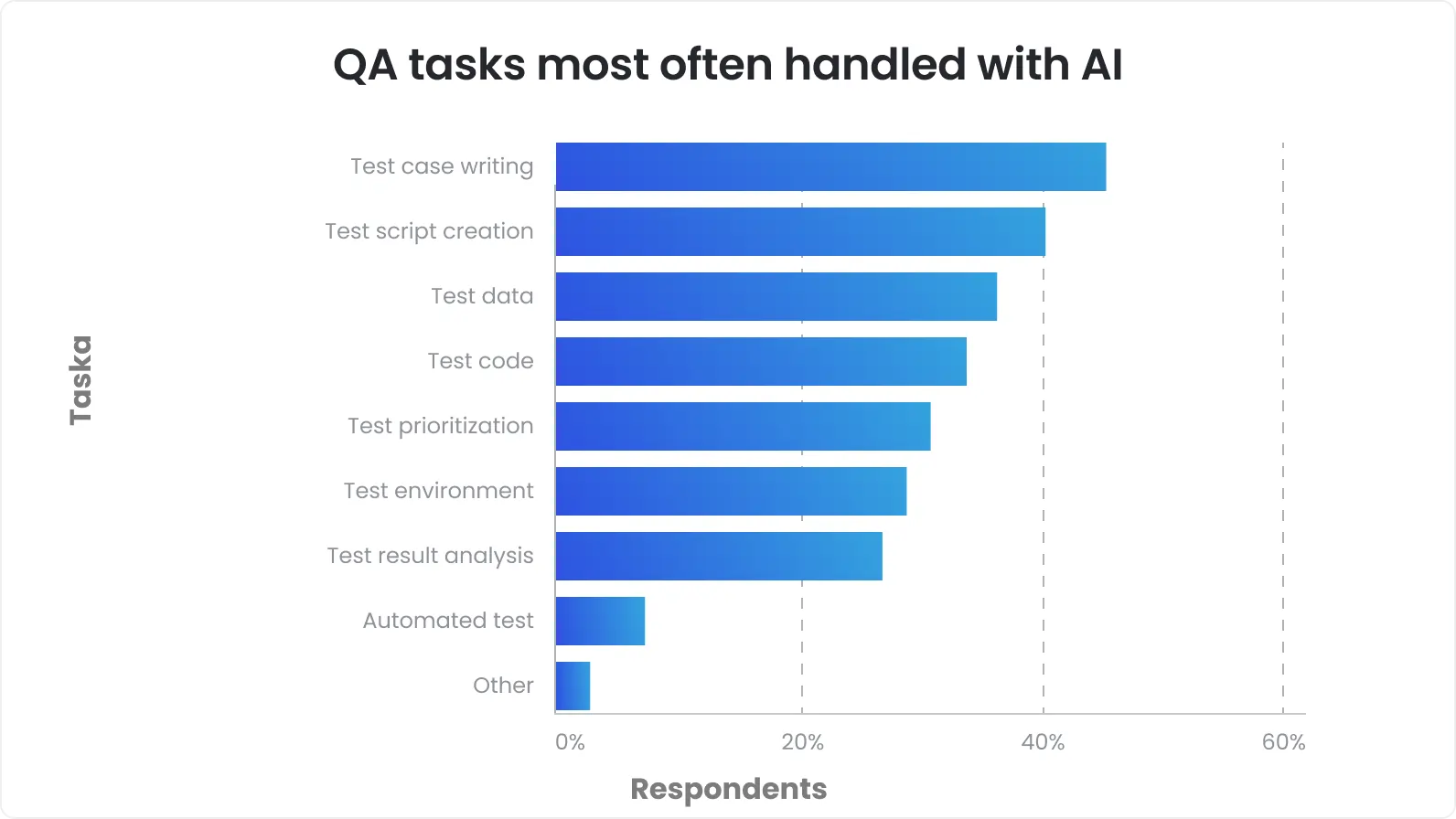11 minutes to read
Impact of Artificial Intelligence in Software Testing


Chief Technology Officer
Summarize with:
Times when AI was considered a futuristic concept are in the past; now it is a powerful engine driving autonomous, efficient, and fast software testing. It is not a question of whether artificial intelligence will transform software testing, but how much it has already.
Moreover, the future of the whole industry is definitely closely linked to AI development. Stats reveal that about 44% of companies have integrated AI into their QA processes, and this figure will be rapidly growing, considering the unstoppable progress of AI and the numerous benefits its implementation brings.
In our article, we’ll outline the most important QA AI-driven advancements, provide key statistics, and discuss how artificial intelligence is reshaping the way QA teams work.
Why is there a need for AI in software testing?
As you surely know, software testing is an essential phase of the software development lifecycle that has a goal to ensure an excellent user experience. Over the years, it has evolved from trivial manual reproduction of user behavior to sophisticated automated testing that provides robustness and accuracy but still necessitates manual test maintenance.
Trusted AI expertise for a secure digital future
With the emergence of DevOps services and solutions, especially the CI/CD practice, e2e automation has become the norm. Yet, even with this progress, human efforts were needed to set up and maintain QA processes. This has changed with AI adoption, which made smarter and more adjustable test automation possible.
Artificial intelligence, or simply AI, is the field of computer science that enables apps and systems to simulate human cognitive functions—reasoning, learning, analysis, problem-solving, language processing, decision-making, perception, and pattern recognition—which results in more efficient task completion across various domains.

What are the advantages of AI in testing?
First and foremost, AI-embedded testing tools ensure higher efficiency and significant time and budget savings.
Though initially, test automation optimized QA processes, now it can hardly keep up with the growing demand for superfast product delivery and the ever-changing market dynamics. As development cycles became shorter and more complicated, typical automation frameworks fell behind.
By embracing AI, modern testing tools have gone beyond running automated scripts. Let’s take a closer look at the major differences between usual and AI-powered test automation.
Goal
Automation of repetitive and tedious tests
Automation, continuous learning, and improvement
Process
Following predefined rules
Adaptation based on learning
Test script creation
Manual
Automated
Data handling
Data collation
Data analysis and learning
Decision-making
Not supported
Supported
Forecasting
Not supported
Supported
Test coverage
From middle to high
High
Learning curve
Deep technical expertise in test scripting is required
An advanced understanding of AI models and tools is required, but the need for technical expertise is reduced
Consequently, AI has taken test automation to new heights while enabling QA teams to deliver products of exceptional quality within the shortest possible time.
Industry trends and statistics
Recent stats and surveys reveal that AI is rapidly conquering the world. According to McKinsey, in 2024, global adoption of AI has surged to 72%, up from just 20% in 2017.
The IDC assumes a huge shift in IT spending toward AI and expects that by 2025, Global 2000 organizations will invest about 40% of their core IT budgets into AI initiatives, fueling an increase in product and process innovation.
As for the global AI-enabled testing market, it also experiences significant growth. Valued at USD 643.5 million in 2022, it is projected to grow to USD 2,746.6 million by 2030, at a CAGR of 20.7%. This tendency is explained by the numerous advantages AI brings to QA.

In essence, QA teams are rapidly adopting AI, with a TestRail survey revealing that 65% of respondents have already integrated AI to varying degrees within their software testing processes. This trend indicates that AI has moved beyond the experimental stage and is becoming an important part of modern QA strategies. Remarkably, this demand has boosted the development of diverse AI-powered testing solutions. Currently, ACCELQ, Applitools, Katalon Studio, Tricentis Tosca, Functionize, Testim.io, and Mabl are among the most widely-used AI-based test automation tools. Still, to be honest, ChatGPT remains the most popular solution assisting with test planning, scripting, and documentation, although it serves just as a supplementary tool rather than a specialized QA tool.
It is worth noting that AI can streamline the most diverse types of testing, from UI and performance testing to mobile and smoke testing. However, the undeniable leader is regression testing. This is no surprise – the run of extremely time-consuming and frequently repetitive regression tests can be immensely optimized by AI-driven test automation.
If we are talking about QA activities in general, the TestRail survey indicates that test case writing, test script development, and test data management are tasks where QA specialists most often seek the help of AI. More details are illustrated in the chart below.

The modern approach to software testing has been considerably changed by artificial intelligence, but there is a strong belief that more exciting advancements are still ahead. As AI technology keeps on evolving by leaps and bounds, innovative QA teams integrate it into their workflows, paving the way for more efficient, autonomous, and faster software testing.
What tasks can AI enhance in software testing?
The outstanding capabilities of AI have made its implementation so tempting across the most diverse domains. As for software testing, its adoption has resulted in the optimization of numerous QA activities. Let’s review the most prominent applications of artificial intelligence in software testing.
Automated test case writing
Recall how much time test case writing usually takes when handled manually – with AI, you can save resources and time while being confident that your tests cover the most varied scenarios. AI investigates app code, user behavior, project requirements, or historical data, and based on the gained insights, crafts proper test cases.
Automated test script generation
AI-based test automation solutions leverage NLP and ML algorithms to thoroughly analyze inputs and create operative test scripts in the chosen programming language. AI fills pre-defined templates with the required commands enabling interaction with the UI, APIs, or other system components.
Migration from one language to another
Migration from one language to another can be a real headache, but cutting-edge AI-based solutions automate the lion’s share of your efforts. By using advanced algorithms, they translate the logic and features of the original test code into the target language. While complete migration automation isn't yet fully achievable, AI-driven solutions can greatly accelerate and simplify the process by handling its core aspects.
Defect prediction
It is a well-known fact that AI is extremely good at predictive analytics. By analyzing code complexity, recent updates, or historical issues, it can easily detect your Achilles' heel—features or modules prone to introducing flaws. Thanks to this proactive approach, QA teams direct their energy on the most problematic software areas, ensuring decent software quality.
Test case prioritization
Similarly, AI can efficiently prioritize test cases based on the analysis of potential risks, code criticality, and previous failures. This improves resource allocation as well as increases testing efficiency. Picture that you need to run regression testing while being hard-pressed for time. In this case, AI can analyze which parts of your code are most susceptible to bugs and prioritize test cases correspondingly. Such prioritization decreases the number of tests to be run, eventually saving a ton of your time.
Real-time monitoring
With AI integrated into CI/CD pipelines, security and performance metrics can be monitored in real time throughout the development process. Advanced AI algorithms recognize diverse anomalies, including slow response times, memory leaks, and security breaches. Serious issues do not go unnoticed due to instant alerts.
Test data generation
Based on recognized data patterns, statistical models, and machine learning, AI can help you create relevant and varied inputs for testing. Moreover, depending on requirements, it generates structured, random, and synthetic data as well as ensures privacy by anonymizing sensitive data. By automating this process, teams take advantage of higher productivity, better scalability, and more comprehensive testing.
Visual testing
These days, ensuring the visual consistency of apps across a plethora of platforms is not such a daunting and time-incentive task. AI-powered visual testing solutions can do this at lightning speed as they can identify a wide range of visual issues, including misplaced elements, color inconsistencies, font mismatches, and layout shifts. AI detects even minor visual mismatches that the human eye is likely to overlook by checking your UI literally pixel by pixel. QA teams that leverage AI-powered visual testing tools manage to reduce the number of visual defects by up to 30%.
Automated test script maintenance
If you have hands-on experience with test automation, you definitely know that test script updating is usually effort-consuming and time-incentive. Fortunately, AI-powered testing tools come with excellent self-healing features that autonomously update test scripts once any changes to the app code have been made, considerably easing QA specialists' work burden.
Test coverage analysis
AI can effectively assess test coverage, ensuring that all core areas of your applications are sufficiently verified. By analyzing available test cases and their associated code, AI identifies gaps where tests are lacking. With these AI-driven insights, QA teams achieve higher test coverage, resulting in better app quality and a lower risk of bugs in production.
There are a multitude of use cases for implementing artificial intelligence in software testing, and all together they lead to substantial improvements in the whole QA process.
Prospects of AI in software testing
It goes without saying that AI is one of the top 10 software testing trends in 2024. Moreover, it is clear that the future of software testing is closely tied to AI advancements.
We are already observing how AI has enhanced existing tools that target particular testing tasks. Taking into consideration the speed with which AI is evolving, we can expect AI to replace entire automation testing tech stacks in the near future.
AI-driven automation testing will address tasks at all levels, including those that now require decisions that only a human can make. While some higher-order QA activities, like security or usability testing, may still need human intervention initially, AI’s self-learning capabilities will eventually allow it to adapt its strategies for handling these more context-driven tasks.
There is a strong probability that artificial intelligence software testing will develop into a separate field and play a fundamental role within the IT industry. As to QA engineers, rather than substituting them, AI is likely to change their roles. They will switch from test execution to high-level duties like test strategy design and exploratory testing.
Conclusion
Artificial intelligence is actually more than just a buzzword; it is a breakthrough in ensuring exceptional app quality. Like your reliable ally, AI takes on the most diverse tasks, from test case creation to test script development, prioritization, and maintenance. Automated completion of these and other activities results in better productivity, higher accuracy, shorter testing cycles, and unmatched product quality. Companies that have already given a shot to software testing with AI report its efficiency and significant improvement across key metrics compared to typical automated testing.
Don’t fall behind! Partner with DeviQA to go further with test automation and remain at the forefront of innovation. Our skilled team will help you leverage the extensive abilities of AI-driven test automation and unleash new opportunities for efficiency, modernization, and thriving. Feel free to contact DeviQA to learn how to use AI in software testing and effortlessly integrate it into your QA solutions.
Team up with an award-winning software QA and testing company
Trusted by 300+ clients worldwide



